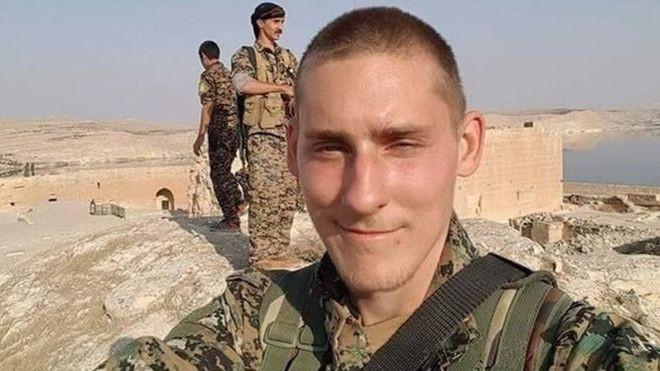Young Brit surrounded by Islamic State militants shot himself to avoid capture
Ryan Lock, 20, killed himself after telling his family he was backpacking inTurkey.

A British man described as a "hero" who fought alongside Kurdish forces in Syria, killed himself to avoid falling in the hands of Islamic State (Isis) militants, an inquest heard.
Ryan Lock from Chichester died in December 2016 with the People's Defence Units (YPG) in Raqqa, considered to be Isis's de facto capital.
The 20-year-old was wounded and surrounded by Isis fighters, leading him to turn his gun on himself to avoid capture and a "frightening and painful death", the Portsmouth hearing was told.
Lock, a former chef who had no previous military experience, joined the Kurdish militia after telling his family he was going backpacking to Turkey last August.
Lock kept in touch with his family by Facebook Messenger, sending them pictures and updates on his military training in the months before he died.
But after losing contact with him last December, Lock's father, Jon Plater, found images online of his son with an Isis fighter standing over his body in Raqqa.
The inquest heard that following his death, a letter was passed to Lock's family by someone called AJ Woodhead.
Believed to be a Canadian, he is thought to have travelled to Syria to fight alongside Lock and the Kurdish forces.
In the letter AJ Woodhead, who British police have been unable to trace, said Lock "died a true hero" and that in any other war he would have received a medal.
Single gunshot wound
Recording a narrative verdict, coroner David Horsley said Lock sustained a leg wound that left him at risk of falling into the hands of a "cruel and ruthless" enemy.
Horsley added: "He was not prepared to let that happen and used his own weapon to avoid capture. That can only be viewed as a brave action."
The coroner described Lock as a "heroic young man", and added: "He died doing something he quite clearly believed passionately in."
Pathologist Dr Basil Purdue said Lock's cause of death was a single gunshot wound to the head.
Lock's mother, Catherine, said that before he left home Lock had mentioned how bad the situation in Syria was, but "it wasn't something he would constantly comment on".
He became secretive, and Catherine said: "Deep down, there were things setting off alarm bells but I wasn't getting the answers."
Lock eventually revealed to his family he was travelling to Syria, to serve with the YPG as a chef with hopes to train as a medic.
His mother said she tried not to be negative for fear of him severing contact and told him: "I'm proud of you, but for God's sake come home safely."
© Copyright IBTimes 2025. All rights reserved.






















